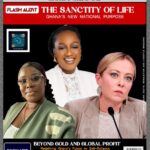Assumpta Weekly News Magazine
Featuring: Three Outstanding Ghanaian Female Broadcast Journalists: Serwaa Amihere, Frema Adunyame and Ms. Assumpta Gahutu Co-Founder of Assumpta Newsletter Publication Magazine and principal of Babies and Toddlers Daycare who brings her insight to the dialogue.
Release Date: Wednesday, June 4th 2025
Flash Alert Update: THE LAWYER:
Theme: Journalism of Neglected Topics
ADVERTISEMENT:







https://www.instagram.com/hairsenta?igsh=MXAzOThhNGZ0Nm15dQ==
🛍️ Hair Senta – Shopping & Retail
📍 24 Jungle Avenue, Accra, Ghana 00233
🌐 www.hairsenta.com
📞 Call Us: +233 054 435 4455 / 024 862 9769
✨ The Best Human Hair Extensions from Ghana to the World! ✨
Transform your look with premium-quality, 100% human hair extensions that blend seamlessly and style effortlessly. Whether you crave sleek straight, luscious curls, or voluminous waves — we have it all.
💃 Trusted, Trademarked & Loved by Thousands
🌍 We Ship Worldwide
🛒 Walk in or Order Online! Be bold. Be beautiful. Be you — with Hair Senta 💖
https://www.instagram.com/hairsenta?igsh=MXAzOThhNGZ0Nm15dQ==
🛍️ Hair Senta – Shopping & Retail
📍 24 Jungle Avenue, Accra, Ghana 00233
🌐 www.hairsenta.com
📞 Call Us: +233 054 435 4455 / 024 862 9769
✨ The Best Human Hair Extensions from Ghana to the World! ✨
Transform your look with premium-quality, 100% human hair extensions that blend seamlessly and style effortlessly. Whether you crave sleek straight, luscious curls, or voluminous waves — we have it all.
💃 Trusted, Trademarked & Loved by Thousands
🌍 We Ship Worldwide
🛒 Walk in or Order Online! Be bold. Be beautiful. Be you — with Hair Senta 💖
NDC’s Ethical Revolution: A New Era of Leadership
#The interdependence of our destinies is not just a philosophy—it is a fact. In times when our ecosystems are under threat, when rivers are poisoned and lakes depleted, the call to defend our collective security must also include the protection of our environment and the values that bind us together.
As mining activities continue to ravage Ghana’s natural resources, criminal networks have grown emboldened—profiting from destruction while leaving communities vulnerable. This is not just an environmental crisis; it is a crisis of ethics and leadership.
Yet today, a turning point appears on the horizon. The National Democratic Congress (NDC) is stepping forward with what many are calling a renewed ethical vision—a transformation rooted in accountability, environmental justice, and respect for human life.
The “new face of ethics” being shaped within the NDC is not just political rhetoric—it reflects a deeper shift: a move toward values-based leadership, where the environment is no longer an afterthought but a cornerstone of national security and well-being.
Naming the Challenge:
Figures like Chairman Wontumi, long linked with environmentally harmful operations, represent what Ghana must now leave behind: exploitation without consequence, power without principle. Their disregard for the sanctity of life and the health of our ecosystem stands in stark contrast to what the future demands.
The Ethical Imperative:
As the NDC redefines itself, it does so with a commitment to lead by example—to place ethics above expedience, to ensure that security includes environmental protection, and to demand that governance reflects the shared values of its people.
This isn’t just about the NDC. It’s about Ghana’s future. The ethical revolution we need must be grounded in action, in policy, and in the courage to confront those who profit from destruction.
Closing Call-to-Action:
In this new era, interdependence is our strength, and ethical leadership is our path forward. The fight for Ghana’s ecosystem is a fight for our collective dignity, and it begins with leaders bold enough to defend what truly matters—life, land, and legacy.:
Taking the Lead Against Environmental Destruction
A bold call for leadership in the face of ecological crisis.
Introductory Paragraph:
As Ghanaians continue to endure the repeated destruction of our lakes, rivers, and ecosystems—often driving communities into extreme poverty—the need for responsible leadership has never been greater. From a human security perspective, it is essential that our leaders, policies, and institutions rise to meet this challenge. Protecting the environment is no longer just an ecological issue—it is a matter of survival, dignity, and justice.
Redefining Ethics in the Fight to Save Ghana’s Ecosystem
Introduction
Ghana is at a pivotal moment in its environmental history. From illegal mining (galamsey) and deforestation to plastic pollution and coastal erosion, the country’s rich ecosystems — including its forests, rivers, coastlines, and wildlife habitats — face existential threats. While laws and regulations exist, the moral foundations that underpin environmental behavior are being challenged. There is a growing need to redefine ethics: to move beyond traditional frameworks that separate humans from nature and toward more inclusive, ecological, and intergenerational ethical models.
1. The Limits of Traditional Environmental Ethics
Historically, environmental responsibility in Ghana has been approached from a utilitarian or anthropocentric lens — focusing on human benefit, such as exploiting forests for timber or rivers for gold. This short-term, profit-driven ethic is insufficient in the face of long-term ecological collapse.
Key examples:
- Galamsey operations prioritize economic gain over water purity, public health, and biodiversity.
- Logging and deforestation often occur despite the knowledge of long-term climate consequences.
Redefinition means shifting the ethical focus from “what benefits us now” to “what sustains all life for generations.”
2. An Ecocentric Ethical Framework
A redefined environmental ethic in Ghana must place nature itself at the center — recognizing rivers, forests, and animals not just as resources, but as entities with intrinsic value.
- Inspired by traditional Ghanaian values (like the reverence for sacred groves or taboos around rivers), this ethics revival draws on indigenous wisdom while integrating modern ecological science.
- Ecocentric ethics also imply legal changes — such as granting legal rights to rivers or forests, similar to movements in New Zealand or Ecuador.
3. Intergenerational Responsibility
Redefining ethics also requires a deepened sense of responsibility to future generations. It means rethinking development goals, rejecting extractive models, and demanding that policymakers, corporations, and citizens alike consider the long-term impact of their actions.
In Ghana, this could mean:
- Enforcing sustainable agriculture and mining practices.
- Investing in youth environmental education.
- Creating policies that hold leaders accountable not only for economic indicators but also for ecological health.
4. Environmental Justice and Equity
Ethical reform must also tackle social justice within environmental discourse. Environmental degradation disproportionately affects the poor, women, and rural communities in Ghana.
- Redefining ethics here involves equity in resource distribution, community participation in decision-making, and restorative justice for communities harmed by pollution, deforestation, or displacement.
- For instance, communities affected by mining must be compensated and included in ecological restoration projects.
5. The Role of Faith and Moral Leadership
Religion and spiritual beliefs are powerful ethical guides in Ghana. Faith leaders can be pivotal in redefining environmental morality by framing creation care as a moral and spiritual obligation.
- Churches, mosques, and traditional spiritual leaders can mobilize communities around the idea that harming the Earth is a sin against both the Creator and future generations.
Conclusion: A Call to Moral Courage
Saving Ghana’s ecosystems is not only a technical or political issue; it is a moral crisis. Redefining ethics is about cultivating a collective conscience — one that values life in all its forms and acknowledges the interconnectedness of humans and nature. It demands a cultural shift, legal innovation, political will, and spiritual awakening.
The fight for Ghana’s environment is a fight for its soul.
🌿 EcoGhana Insight
JUNE 2025 EDITION
Theme: Redefining Ethics in the Fight to Save Ghana’s Ecosystem
📰 IN THIS ISSUE
- Editorial: A New Moral Compass for a Nation at the Brink
- Case Study: Galamsey and the Erosion of Ethical Responsibility
- Spotlight: Sacred Forests and the Wisdom of Our Ancestors
- Voices from the Field: Youth Leaders on the Frontline
- Call to Action: What You Can Do Today
EDITORIAL
Redefining Ethics in the Fight to Save Ghana’s Ecosystem
Ghana is blessed with a rich mosaic of forests, rivers, coastlines, and wildlife. But beneath the surface of this natural beauty lies a troubling reality: our ecosystems are deteriorating — fast. Galamsey operations poison our rivers. Illegal logging strips our forests. Plastic waste chokes our streets and seas.
The crisis we face is not just environmental — it is ethical.
The time has come to redefine our values, and with them, our relationship with nature. Ghana must move beyond the idea that nature exists solely for human use. We must embrace a more inclusive and ecocentric ethic — one that acknowledges the rights of rivers, trees, animals, and future generations.
This redefinition isn’t foreign. It’s rooted in our indigenous traditions, where sacred groves were protected, water bodies were respected, and nature was never viewed in isolation from human life. Today, we must revive and modernize those traditions to meet the urgency of our times.
This is a moral reckoning — and also a profound opportunity.
CASE STUDY: GALAMSEY & THE COLLAPSE OF ETHICAL ACCOUNTABILITY
In recent years, the explosion of illegal small-scale mining has turned once-lush riverbanks into lifeless scars. Galamsey is not just a legal issue — it is an ethical failure.
- Who benefits from the gold, and at what cost?
- What happens to the farmers, fishermen, and schoolchildren who depend on poisoned waters?
- Who speaks for the rivers?
Ethics, in this context, must move from vague ideals to concrete responsibilities — for miners, for leaders, and for every citizen.
SPOTLIGHT: SACRED FORESTS AND ANCIENT WISDOM
Not all ethical frameworks need to be imported. Long before environmental NGOs, many Ghanaian communities practiced a sacred ecology. Forests like the Tano Offin and Bosomtwe were protected by cultural taboos, often more effective than government policy.
Today, modern environmentalists are looking back to look forward — asking:
Can we revive these systems to inspire new laws, school curriculums, and community-based conservation?
VOICES FROM THE FIELD: YOUNG LEADERS SPEAK OUT
From Tamale to Takoradi, a new generation of youth is rising to protect Ghana’s environment. We asked a few of them:
🧘🏿 “Redefining ethics means refusing to stay silent while others destroy what belongs to all of us.”
– Akua Mensimah, 23, Eco-club Leader, Cape Coast
🧘🏿 “We are not just activists. We are guardians of the future.”
– Daniel Owusu, 19, Student Organizer, Accra
This youth movement is demanding more than awareness — they want justice, accountability, and a seat at the policy table.
RETHINKING DEVELOPMENT: ETHICS & ECONOMICS MUST ALIGN
For too long, Ghana’s development path has sacrificed ecosystems for short-term gain. A redefined ethical stance means asking tough questions:
- Is a mining permit more valuable than a clean river?
- Can a new highway justify the destruction of a rainforest?
- What if progress was measured not just in GDP, but in biodiversity, clean air, and community well-being?
We must balance economic aspirations with ecological integrity.
FAITH & MORAL LEADERSHIP: THE PULPIT AND THE PLANET
In churches, mosques, and traditional shrines, a powerful message can take root: Caring for the Earth is a divine duty.
Faith leaders across Ghana are increasingly integrating environmental stewardship into sermons and teachings. Their voices can bridge the gap between spiritual values and scientific urgency.
CALL TO ACTION: WHAT YOU CAN DO TODAY
✅ Join a local tree-planting or clean-up initiative
✅ Support or volunteer with community conservation groups
✅ Educate your circle on ethical environmental behavior
✅ Hold your leaders accountable — demand transparency in environmental policy
✅ Use your platform — however small — to speak for the voiceless (including rivers, forests, and future generations)
IN SUMMARY
Redefining ethics in the fight to save Ghana’s ecosystem means:
- Moving from exploitation to stewardship
- Expanding the circle of moral concern to include nature and future generations
- Reviving indigenous wisdom and combining it with modern solutions
- Demanding a new development model that is just, inclusive, and sustainable
This is a moral moment. Let’s rise to it — together.
Your Thoughts Matter
What does environmental ethics mean to you? How are you helping redefine the future?
📩 Send your insights to: ecoinsight@greenghana.org for a chance to be featured in next month’s issue.
Special Feature Dialogue
Assumpta Weekly News Magazine | Special Edition: “The Lawyer”
Theme: Redefining Ethics in the Fight to Save Ghana’s Ecosystem
Headline: “NDC’s Ethical Revolution: A New Era of Leadership”
[Opening Dialogue by Host Frema Adunyame]

Frema Adunyame (Host):
Good morning, Ghana, and to all our readers and listeners across Africa and beyond. I’m Frema Adunyame, and this is Assumpta Weekly News Magazine, Special Edition: “The Lawyer.”
Today’s dialogue is not just timely—it is necessary. We are gathered to unpack one of the most important conversations of our time: ethics, environment, and leadership in Ghana. This is a moment that cuts across politics, culture, spirituality, and survival.
With me today are two powerful voices—two women whose work continues to shape both national consciousness and international perception of Ghanaian excellence.

[Guest Introductions]
First, Serwaa Amihere, multiple award-winning Ghanaian broadcast journalist, humanitarian, and social commentator whose journalistic voice has consistently broken new ground in political discourse, civic accountability, and women’s empowerment. Her work has brought complex issues—like environmental corruption and governance ethics—to the public square with clarity and courage.
And joining us from the heart of civic media reform is Ms. Assumpta Gahutu, Co-Founder of Assumpta Newsletter Publication Magazine and Principal of Babies and Toddlers Daycare, a powerhouse of community engagement, early childhood education, and environmental advocacy. Her magazine has become one of Ghana’s most fearless civic publications—delivering insight at the intersection of law, policy, and moral responsibility.
Welcome to you both. What a privilege to hold space with such formidable Ghanaian women.
📰 Dialogue Begins
Article Title: “NDC’s Ethical Revolution: A New Era of Leadership”

Frema Adunyame:
Let’s begin with the headline of our featured article: “NDC’s Ethical Revolution: A New Era of Leadership.” It’s not just bold—it’s stirring.
I’m struck by the line in the article:
“The interdependence of our destinies is not just a philosophy—it is a fact. In times when our ecosystems are under threat, when rivers are poisoned and lakes depleted, the call to defend our collective security must also include the protection of our environment and the values that bind us together.”
Ms. Gahutu, welcome to Assumpta Weekly News Magazine. Let’s begin with you—what is your response to this powerful framing of ethics in Ghana’s political renewal?
Ms. Assumpta Gahutu Responds

Ms. Assumpta Gahutu:
Thank you, Frema—and let me begin by saying what an honor it is to be part of this vital conversation.
That line you quoted? It is more than philosophical—it is prophetic.
For decades, Ghana has approached development through a lens that disconnects economy from ecology, policy from people, and leadership from legacy. What we are witnessing now—what this article articulates so well—is a potential turning point: a political movement that is re-centering ethics not as a slogan, but as a structural pillar.
The NDC’s emerging posture—if sustained—signals a radical shift toward values-based governance. It is no longer enough to talk about votes and power. The people want integrity. The land demands justice. The rivers cry out for protection.
In my view, ethics cannot be partisan. Environmental justice must be universal, and political leadership must be morally accountable, especially in the face of irreversible ecological loss. That’s the call in this article—and it’s time we all listen.Frema Adunyame Interjects Thoughtfully.

Frema Adunyame:
Assumpta, you’ve said something deeply resonant: “Ethics cannot be partisan.” And yet, the article doesn’t shy away from naming names. It calls out Chairman Wontumi and others who have been linked to ecological devastation.
Serwaa—let me bring you in here. As a journalist, you’ve interviewed power brokers and policy leaders alike. What’s your take on this idea of “a new face of ethics” within the NDC and its significance in the national conversation?
Serwaa Amihere Responds.

Serwaa Amihere:
Thank you, Frema. And thank you, Assumpta, for laying such a powerful ethical foundation.
Look—there’s something urgent happening in this country. People are angry. They’re grieving. And increasingly, they are awake to the fact that our environmental collapse is not inevitable—it’s engineered by greed, protected by silence, and ignored by policy.
So when the article says “the NDC is stepping forward with a new ethical vision,” it’s not just reporting—it’s testing a claim. Is this real? Is this political theatre? Or is it finally a reckoning?
I think many Ghanaians are saying: We don’t want promises—we want policy. We want prosecution. We want protection for our forests, our waters, and our unborn children.
The real question for me isn’t whether the NDC has a new face. It’s whether it will have the moral courage to sustain it, even when it costs votes, partnerships, or power.
A Turn to Moral Accountability

Ms. Assumpta Gahutu:
And to add to that—this “ethical revolution” must also include restorative justice. Communities harmed by galamsey deserve not just apologies—they deserve restoration.
We cannot redefine ethics without repairing the past. The rivers that were poisoned must be cleaned. The farmers who lost their land must be compensated. The schoolchildren who drank mercury-laced water—what is justice for them?
On Intergenerational Responsibility

Frema Adunyame:
Absolutely. And that brings us to one of the most stirring sections of the article: the emphasis on intergenerational responsibility.
Assumpta, your work in early childhood education makes you a fierce advocate for the next generation. What role do you think educators—and frankly, mothers—must play in shaping this ethical reawakening?

Ms. Assumpta Gahutu:
The truth is: Children inherit our decisions.
If we teach them that cutting down a tree is progress—but protecting a forest is a weakness—what future are we building?
As educators, as mothers, and as leaders, we have a duty to model ethical leadership, to raise citizens who understand that the Earth is not theirs to own, but theirs to steward.
And I believe that the classroom, like the pulpit and the press, is a frontline for this revolution.
This article is not just timely — it is critical. Galamsey is not just an illegal activity; it is a moral failure. It’s about profit over people, silence over justice. And behind this silence are powerful players — foreign mafias, multinational companies, and corrupt political figures who benefit from the destruction.
“The Mafia hates us. Hard prison awaits corrupt power. We speak truth to power.”
That is why the NDC must not just oppose this system — it must lead the charge for anti-mafia ethics. Ghana doesn’t need more weak promises. We need bold ethical leadership.

Serwaa Amihere:
Absolutely. I believe the phrase from the article says it all:
“This isn’t just about the NDC. It’s about Ghana’s future.”
The environmental degradation caused by galamsey is not isolated — it’s systemic. It’s political. And the silence of those in power is complicity.
“History won’t remember silence. It will remember courage.”
If the NDC wants to be the new face of ethics, then it must show moral courage, not just policy plans. That means going after the real beneficiaries of destruction — both local and foreign.

Frema Adunyame (Host):
That was powerful. From polluted rivers to disappearing forests, the crisis we face is both environmental and ethical. And the call is clear: rise or perish.
To our viewers and readers, this isn’t just politics — this is about life, land, and legacy. Let us redefine our ethics before nature redefines our survival.
Ms. Assumpta Gahutu:
Thank you, Frema. Thank you, Ghana. This article is not just timely — it is critical. Galamsey is not just an illegal activity; it is a moral failure. It’s about profit over people, silence over justice. And behind this silence are powerful players — foreign mafias, multinational companies, and corrupt political figures who benefit from the destruction.
“The Mafia hates us. Hard prison awaits corrupt power. We speak truth to power.”
That is why the NDC must not just oppose this system — it must lead the charge for anti-mafia ethics. Ghana doesn’t need more weak promises. We need bold ethical leadership.

Serwaa Amihere:
Absolutely. I believe the phrase from the article says it all:
“This isn’t just about the NDC. It’s about Ghana’s future.”
The environmental degradation caused by galamsey is not isolated — it’s systemic. It’s political. And the silence of those in power is complicity.
“History won’t remember silence. It will remember courage.”
If the NDC wants to be the new face of ethics, then it must show moral courage, not just policy plans. That means going after the real beneficiaries of destruction — both local and foreign.

Frema Adunyame (Host):
That was powerful. From polluted rivers to disappearing forests, the crisis we face is both environmental and ethical. And the call is clear: rise or perish.
To our viewers and readers, this isn’t just politics — this is about life, land, and legacy. Let us redefine our ethics before nature redefines our survival.
Thank you, Serwaa. Thank you, Ms. Gahutu. And thank you, Ghana.
This is Assumpta Weekly News Magazine. We speak the truth. We defend justice. We lead change.
“Your voice is power. Use it. Speak. Resist. Rebuild.”
Closing Reflections: The Path Forward

Serwaa Amihere:
What I’m hearing—and what this article so beautifully calls out—is this: The battle for Ghana’s future will not be won with excavators or slogans.
It will be won by those who dare to say: We choose life. We choose legacy. We choose to lead with conscience.

Frema Adunyame (Closing):
Thank you, Assumpta. Thank you, Serwaa. What a remarkable, necessary dialogue..
To our readers, our viewers, our listeners—this is your invitation: Redefine your ethics. Reclaim your voice. Defend your future.
Because the rivers are watching. The trees are listening. And the next generation is asking: “What did you do when the Earth cried out?”
I’m Frema Adunyame, and this has been Assumpta Weekly News Magazine. Stay bold. Stay brave. And always—stay ethical.









